- Home
- Alex Hughes
Payoff Page 3
Payoff Read online
Page 3
“Some campus-wide hangout at the Plantation,” he said, then frowned. “Well, it’s not my scene. He went sometimes, but he did the frat party thing too. He liked to drink too much, if you know what I mean.”
I looked at the guy, hyped on caffeine and almost certainly something else, and wondered why he’d felt the need to say something. But people could get real judgmental on other people’s habits, even if they had their own.
“Did he have trouble sleeping much? Did he seem erratic? Up and down?” I asked.
“Sometimes. Look, he paid the rent on time. He’s not a bad roommate,” he said.
“And the Plantation?” I asked.
“It . . .” George paused.
“Yes?”
“Well, it doesn’t have a great reputation. My friends tend to stay away from that crowd. Listen, it’s getting late and I’ve got a paper due in an hour.” He looked at the door significantly.
Cherabino handed him a card. “You’ll call us if you remember anything else?”
“Of course,” he said, and stood up, obviously a prompt for us to go.
“Anything at all?”
“You got it, man.” He looked at the door again.
“We’ll be getting out of your hair now,” I said.
* * *
Billy Oden’s campaign office was on the bottom floor of a large post–Tech Wars concrete condominium building, next door to a dry cleaner and a pizza place. The signs in his window—OUTSTANDING ODEN, VOTE ODEN, and other uncreative examples of the type—were printed in garish colors and blocky fonts so large you couldn’t possibly overlook them.
The bell over the doorway rang dully as we entered. It was dim inside, the window largely covered by the signs, and it took a moment for my eyes to adjust. Long rows of tables filled the large room beneath another garish sign, each table filled with papers and people. In the back of the open space, maybe twenty feet back, a boxy office stood next to the restrooms. Its walls didn’t reach all the way to the ceiling, and its door closed with a click. The outside walls in the building, like most of the buildings built after the war, were three feet thick, and the acoustics as a result felt heavy and muted.
There was also a security guard, as was traditional for this kind of post-war building, a hefty guy with a large gun seated in an alcove eight feet away on the right wall. I wouldn’t be surprised if a huge concrete cover sealed up the building’s front every night; after the Tech Wars, people got paranoid, and for good reason. Why a politician had chosen this particular building with all its paranoia rather than the newer grown-crystal open buildings told me something about his character.
As we walked in, a hawkish guy in a far too expensive suit punctuated an order to another, then stood up. He came over, his hard-soled shoes making hollow thuds on the floor. “How can I help you?” In his mouth, the standard words became almost a curse.
“DeKalb County Police Department,” Cherabino said, flashing a badge. “We’d like to speak with Senator Oden.”
He adjusted his cuff links. “Of course,” he said, in a tone that said anything but. “His earliest available appointment is tomorrow.”
“It’s in his best interest to cooperate with law enforcement. I’d like to speak with him now,” Cherabino said evenly, a kind of leashed expectation coming over the Link. “Who are you?”
“Rafael Mantega, Senator Oden’s campaign manager,” he said smoothly. “And I’m afraid the earliest available appointment is tomorrow morning. I can offer you a slot at eight-thirty a.m.” He seemed pushy, and I wished I could read him to see why, but I felt nothing.
Cherabino held her ground. Finally she shrugged. “Put us down for eight-thirty then. But it will be here, not at the capitol.”
“Of course,” Mantega said smoothly. “Who should I attribute the appointment to?”
She frowned.
“Detective Cherabino,” I told him.
“I’ll make a note.” He smiled an empty smile, his eyes following us as we exited the door. “You have a pleasant day.”
In the steel-lattice-reinforced parking deck behind the building, I asked Cherabino, “Is it suspicious they won’t talk to us right away?”
“Could be. Probably Mantega’s just being an asshole, throwing his weight around.”
“You’re still going to run a background check on him, aren’t you?” I asked.
She stared at me, her car door half-open.
“Sorry, stupid question.”
* * *
The Plantation was an old house in the style of Gone With the Wind, with a cluster of huge tall columns, two porches, and a yard that was trampled down so dramatically it was nearly half dirt. It was set far back from the road, down a long dirt path with tire tracks on its sides in long rows. Huge trees, twisted from the pollution and the aftermath of the Tech Wars, shaded the area. It was two o’clock in the afternoon, and the bright sunlight, even under the trees, was not kind to the house. The paint was peeling in small strips, the columns dented and stained near the base. And the bronzed-lettered square sign on the street had a pair of dirty underwear hanging from its corner and two letters missing.
Cherabino parked her unmarked detective’s car close to the house, angling the driver’s side for an easy dash back to the car. Since I’d been cut off from the world and seeing only her thoughts these last few weeks—even with her mostly blocking me out lately—I was starting to notice how many things she did, as she put it, “with an eye to officer safety.” Even the way she got out of the car, watching the bushes and the house out of habit and cautiousness, stood in sharp contrast to my normal habits.
A month ago, I would have been able to tell whether there was someone there from a distance; I was a Level Eight telepath, and even the quietest mind made ripples in Mindspace I could detect through training, power, and experience. But now—now. I still couldn’t feel anything but Cherabino’s mind, the world a wash of static. If someone charged out with a gun, I wouldn’t be able to drop them with a thought. Not now. I looked at the bushes myself, and suddenly felt vulnerable. Not only could I not see danger coming, but I couldn’t take it out. Not even one, lone guy.
Was this how regular people lived all the time? Was this how I would live now, if my mind didn’t heal itself? Sometimes they didn’t, after the kind of trauma I’d been through, and—
“Ahem,” Cherabino cleared her throat pointedly. “Let’s get this done and back to the station on a reasonable time schedule, okay? I have other cases to work today.”
I sighed and closed the car door, a soft snick, and I followed her, cautiously, all the way up the front of the house and inside the huge double doors, which were hanging slightly open.
Inside, a man’s voice called out, annoyed, “Are you back with the carpet cleaner? What did you do, stop at three stores?”
“Who is this?” Cherabino called back. She was bladed, her shoulder leading, hand close to the gun without making a production of it. She was expecting trouble, and for the first time since my Ability had shorted out, I felt . . . naked. I didn’t have a gun, and for the first time, I needed one. I didn’t have telepathy. I didn’t even have a rock to throw.
We were standing in an old entryway, ancient wood floors with chips and scratches so deep you could hardly see the grain. A long, Scarlett O’Hara–type staircase went up to the right, to a place we couldn’t see, and to the left, where the voice had come from, someone had knocked out a wall and set up a raised area with tables and chairs, bright disco lights and a dais on the end, presumably for a DJ since there was DJ equipment set up. Shiny mechanical spinners lined the walls, covered in mirrors. More mirrors adorned the tables, so that, at night, with the lights going, it would be a veritable treasure-trove of glittery lights. Here, now, in the daytime with the blackout curtains up and away, letting sunshine in, you could see the layers and layers of faded stains on the small strips of carpet on the outside of the room, and the deep scratches on the tables and dirt on the floor. This was the kind o
f club that was ridden hard and put away wet, and I felt dirty just standing here.
Cherabino moved forward, around the corner to the left, toward the voice.
“You know very well what . . . You’re not Parna,” a dangerous voice returned, and Cherabino stopped, her hand going to her gun.
I turned the corner too—a wide door on tracks was closing. Cherabino had seen something; she’d seen something to spark recognition and surprise but I hadn’t seen what.
Standing in front of the now-closed door was a white, overweight guy in an Atlanta Braves baseball cap, with the small three-dot tattoo on his right hand that would tell paramedics he had an artificial heart. He was sweating, droplets of it on his neck, and the butt of a gun showed faintly through his shirt on his waistband.
“The club is closed,” the guy said, his face screwing up in what should have looked ridiculous but instead looked fierce, like the glare of a bulldog before he bit down and didn’t let go.
Normally at this point Cherabino would have flashed the badge, but oddly, here, she didn’t. “When’s it going to open?” she asked instead, her voice pitched higher, like a silly college girl. She played with her hair in a way that made her suddenly less threatening. I did a double take. She could almost pull that off.
But I could take a cue. “Yeah, I majorly need a break,” I said, and pulled her toward me suddenly.
She threatened me with violence over the Link if my hands got too friendly, but giggled. “We need someplace to go,” she said, and put her hand on my face, shyly.
The guy with the gun relaxed his body language. “We’ll be open at six,” he said.
“We’ll see if we make it that long,” I said, smiling down at her lecherously.
The threats in Cherabino’s head escalated into a kidney blow, but she smiled, playing along for his benefit. She giggled again. “Let’s get out of here, okay?”
And we wandered out, hand in hand, flirting—me enjoying it immensely while the back of my neck itched like someone was going to shoot me at any moment. But we made it back to the car and she pulled away.
“What was that all about?” I asked.
She shot me a glare. “Drugs. A lot of them, and guns, and ammunition. They’re running a major operation out of the place—and, better, we have a guy inside already.”
* * *
She drove us through the skylanes to a small divey barbeque joint maybe ten miles away, and got a table. We ordered tea and waited. And waited. I got more and more tired, and finally asked the waitress for a cup of coffee, which made me feel jittery but got me to focus.
Finally, forty minutes later, Johnny Kubrick walked in the door. He sat down at the table, took off his filthy knitted cap, and scratched his scalp. The tracks on his arms flexed with the movement, and his painfully-thin face grimaced. Cherabino offered him wipes she’d gotten from the waitress earlier. He nodded to me, and took them.
“Hey, sweetcakes,” he said to Cherabino.
She blushed, and didn’t object to the title, which was odd.
“You working the Plantation?” I asked him. We’d worked together for a year or two, taking down the guys who’d once sold me my drug.
“That’s right.”
“I was starting to think you missed the signal,” Cherabino said, with a little smile.
“Naw, just needed a second to extricate smoothly. Good to see you again.” He winked at her.
Huh? There was some history here I wasn’t aware of, I could feel it. It took everything in me not to sneak out over the Link and take the information from her, but I’d promised. And my promises meant something. Or at least they did, now.
Kubrick meanwhile had washed off the apparent caked-in grime from his hands, the apparent track marks on his arms, and was working on the black-eye makeup on his face. He had a pile of wetwipes on the table already, their formerly-pristine surfaces now covered in multiple colors of dark pigment. His face, once he finished swiping at it, ended up a little streaky, like a rock musician after a crazy-sweating concert, but it was obvious, once the makeup was off, that he was just lanky, thin, naturally. The sickness, the addict’s heaviness and history ground in, well, they’d all been painted on, and had come off that easily. He still smelled, but I was betting that was the clothes he was wearing; he’d always smelled like a rose when he wasn’t undercover.
“Thank you,” Kubrick said to the waitress, as she dropped off a cup of coffee for him. She did a double-take and smiled uncertainly before taking our orders. As I remember, she was dating one of the beat cops from the area, and could be trusted to keep her mouth shut—or at least Kubrick had some kind of reason to believe that, or he wouldn’t have taken off the disguise where she could see him.
So. Time to order. I got a soyburger with real pulled pork, real bacon and pickles, with Brunswick stew and home fries. Cherabino got a loaded baked potato with fried okra on the side and a large unsweet tea. And Kubrick got a salad. A big salad with every conceivable vegetable, and he ordered it like it was the finest ambrosia available. Maybe to him, it was. It certainly cost enough.
“Funny seeing you here,” he told us. “You’re a little out of your territory. I assume Homicide has a pending case?”
She nodded, her face a little softer. She was very comfortable with Kubrick—very, very comfortable; she wasn’t putting up the walls she usually did with the other cops. “We’re looking into the death of a college kid. It’s got connections to the system in Decatur,” she said. “The kid’s roommate says he’s involved in the drug scene, and that it was out there in the Plantation. Looks like a point-blank gunshot, a la drug execution. Doesn’t look good for your guys.”
Kubrick frowned. “What does the student look like?”
Cherabino gave a description.
He nodded. “I’ve seen him. I’m surprised you even got a glimpse. This group is careful. They lock their doors obsessively, they clean up after themselves. You wouldn’t believe the hoops I had to jump through just to buy the first dose of drugs. They normally require a student ID, if you can believe it. Did you use the telepathy?” he asked me, in a tone of idle curiosity.
I shrugged. He’d liked my “extras,” as he called them, back when we’d worked together bringing down dealers, but it had been awhile, and I wasn’t—under any circumstances—going to mention the sprained mind to him. Most normals feared telepaths, back in the back of their heads, whether they admitted it or not. I wasn’t going to give him or anyone else a reason to think I was weak.
“Tell me about the dead kid,” I said.
Kubrick sat up, rubbed his nose, thought about it. “He’s been coming to the Plantation as a party-goer for awhile. Rumor has it they’ve put him on a rub-a-dub.”
“Rub-a-dub?” Cherabino asked.
He sighed. “Give the kid some overpriced drugs on credit, get him good and hooked with a real big bill, then tell him the only way to work it off is to start dealing. You do it with somebody you don’t think is going to be easily suspected, somebody who’s hooked but not desperate, somebody good with street smarts who has contacts you think you can turn into money. Rumor has it he was supposed to be selling on the campus, but nobody there seems to know about him.”
“So he can’t be selling much,” I said.
“Or he’s doing it so quiet none of the guys are hearing about it. Campus PD is great at finding the drugs. They have dogs sometimes, they have people inside, and every year they pay a student to buy before they sting. That’s why the traffic’s out of the club, back there. It’s easier. Campus doesn’t have jurisdiction. That’s why they called the county narcotics unit, though; won’t be long—if you didn’t spook them too bad—before we have them red-handed.”
“How much was Raymond buying?” I asked, out of curiosity. With his class load and that internship, and him still with his head above water, I couldn’t see him having a heavy habit, not yet. Things tended to fall apart in those situations, ask me how I knew. Of course his drug was— “What
was he buying?” With the right kind of synthetics, you could be boosted right through the courses.
“That’s the thing,” Kubrick said. “He was buying old-fashioned straight snow cocaine. The pricey stuff. And to get him on the line they were probably charging twice what it was worth. Even at twice a week, he was blowing through money like nuts.”
“Where did he get that kind of money?” Cherabino asked.
“Stealing,” I offered, quietly. “Cons. Stickups. Or some kind of skill you can barter for cash from the right kind of people. It’s there, if you’re willing to go low enough.” All sorts of things were there if you were willing to go low enough.
Our food arrived. We dug in, but my fancy burger with all the fattening stuff didn’t have much taste. Raymond was from a good family, a rich background. And it sounded like he’d been on the first rung of that ladder I’d ridden down to hell and back—the first stages of the world falling apart.
“So,” Cherabino said quietly. “Any reason to think someone ordered Raymond killed? Maybe one of the guys from that room?”
Kubrick paused, fork on the way to his mouth. “That’s the thing. Nobody’s in a turf war right now, nobody’s actively pursuing the college except this group. And Raymond wasn’t making any waves that I could see. They had him right where they wanted him. No reason to wish him dead—much less to do it. If you’re asking me—”
“We are,” I said.
“If you’re asking me, whoever killed him wasn’t involved in this drug group. Maybe it’s on the selling end. I can try to find out who exactly he was selling to. But my gut says whatever the issue was wasn’t drugs.”
“You sure?”
“It’s just a gut. Nothing like your stuff. But my gut is usually right about this kind of thing.”
“Even so. Catch us up with the players in this group,” Cherabino told Kubrick, and added, “please.”
And I got a sudden, intense flash of interest from her, and then him and her in the middle of sex, and I knew he had a tattoo on his hip. I shut down the Link as much as I could, strong, from my end, and shuddered. Old memory, faded with time, but—

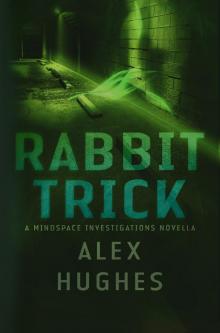 Rabbit Trick: A Mindspace Investigations Short Story
Rabbit Trick: A Mindspace Investigations Short Story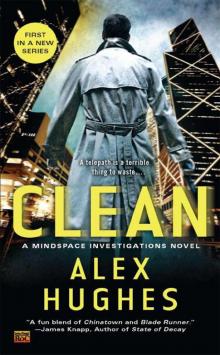 Clean: A Mindspace Investigations Novel
Clean: A Mindspace Investigations Novel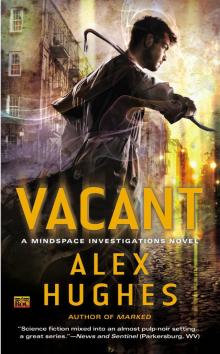 Vacant
Vacant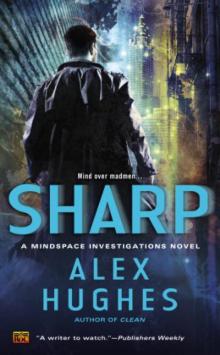 Sharp: A Mindspace Investigations Novel
Sharp: A Mindspace Investigations Novel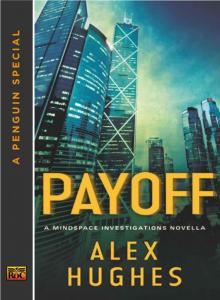 Payoff
Payoff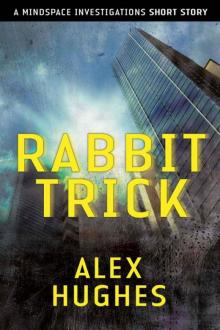 Rabbit Trick: A Mindspace Investigations Novella
Rabbit Trick: A Mindspace Investigations Novella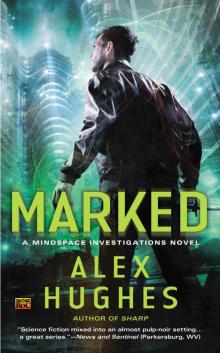 Marked
Marked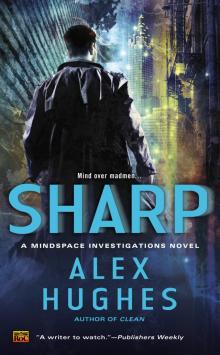 Sharp
Sharp